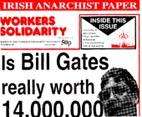Over 30 years of anarchist writing from Ireland listed under hundreds of topics
3,000 police evict Mexican students after nine month UNAM occupation
SUNDAY, FEBRUARY 6TH: Students from the National Autonomous University of Mexico, the largest and historically the most prestigious university in Latin America, were engaged in debate over the slim chances of achieving effective negotiation with the University Council. This was to enable classes to restart after a lengthy strike which had seen the occupation of all the university buildings, the erection of barricades around the campuses and monster marches through the streets of Mexico City.
The strike was characterised by marathon assemblies in which the General Strike Council decided on strategy and drew up proposals to be put to the University Rector, the Mexican government and to Mexican society in general.
The police - Federal Preventative Police as well as judicial, highway and auxiliary agents - came in the early hours of the morning and arrested everyone in their path.
The students had been protesting since March 1999 in response to the University Council's decision to raise fees from a fairly nominal rate (less than a hundred pesos per year) to the more substantial sum of a hundred dollars. This in a country where many workers are on as little as three dollars a day and are entirely unable to put any of their wages aside for education.
Up to 40% of the population are estimated to live in "extreme poverty" (meaning that it is a mystery to the statisticians how they manage to stay alive at all). The slums and shanty towns around the world's largest city - with up to 40 million people residing in the greater urban zone - are growing daily, despite the healthy state of economic indicators and the proliferation of Mexican dollar billionaires.
As the protest movement snowballed and an indefinite strike was called, the students' demands became broader and began to address such controversial issues as free public education, student control and university autonomy, as well as the fight for democracy in Mexico. Hundreds of thousands of people - students, workers, parents and other concerned citizens - took to the streets to voice their outrage at the fee hike and the lack of proper funding for the state universities, of which the UNAM is by far the most important.
Hanging over these marches was the shadow of October 2nd, 1968, when literally thousands of students were gunned down in Tlatelolco Square in a show of force by the regime, just before the Olympic Games opened in Mexico City. Although the same party is still in power - the Party of Institutional Revolution has governed Mexico since 1929 - the feeling was that such a violent response would probably not be repeated in the capital city.
Rector Francisco Barnes took a hardline approach to the students' demands. Barnes, a champion of free market values, had introduced an "independent" examining body which took over many of the University's functions in this area. Known as the CENEVAL, it was in fact controlled by private enterprise and disregarded many of the University's traditionally liberal values. Backed by the government and the two main TV networks, Televisa and TeleAzteca, the rector poured ridicule on the students, cheekily accusing them of anti-democratic practices. Barnes refused to meet the students on equal terms, and was finally forced to stand down in December of last year.
By January 2000, however, the student movement was visibly weakening. Most of the students had had no classes since the strike commenced, and the resolve of many was beginning to waver. Some of the more moderate supporters of the strike were suggesting that it might be possible to negotiate with the government and the new rector even if the university buildings were vacated. Radical students from working class backgrounds pointed out that the government had never shown itself worthy of such trust in the past, and expressed a desire to continue.
630 students were arrested in the main police raid on February 6th. This came on top of an estimated 250 arrests on February 1st after police entered a preparatory school and injured 37 people. Some of these have since been released on bail, but many hundreds remain in custody. 89 students were initially accused of terrorism, sabotage and criminal association, but these charges have since been dropped.
National and international human rights groups have expressed grave concern at the conditions the prisoners are being held under. In particular, the government is continuing to fly in the face of the students' right to bail on the grounds that they constitute a threat to security and might attempt to reoccupy the university.
In a statement, Amnesty International said they were monitoring the legal proceedings very closely to ensure they conformed to international fair trial standards. Many of the students have reportedly been denied access to independent legal advice, and still others are believed to be gravely ill.
The Irish Mexico Group is calling on concerned groups around the country to write letters of protest to the Mexican Embassy and the Mexican authorities. The group may be contacted c/o LASC, 5 Merrion Row, Dublin 2. Tel. 01-6760435.
Nick Jones
Stripping cops
Hundreds of residents of Francisco I Madero took 61 police prisoner after the police violently evicted striking students from the Escuela Normal Rurale El Mexe. The police were stripped to their underpants, tied up and marched through the streets before they were swapped for 376 strikers arrested in the eviction.


